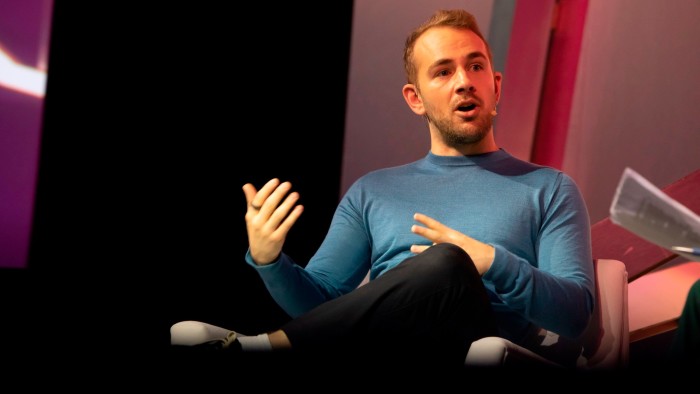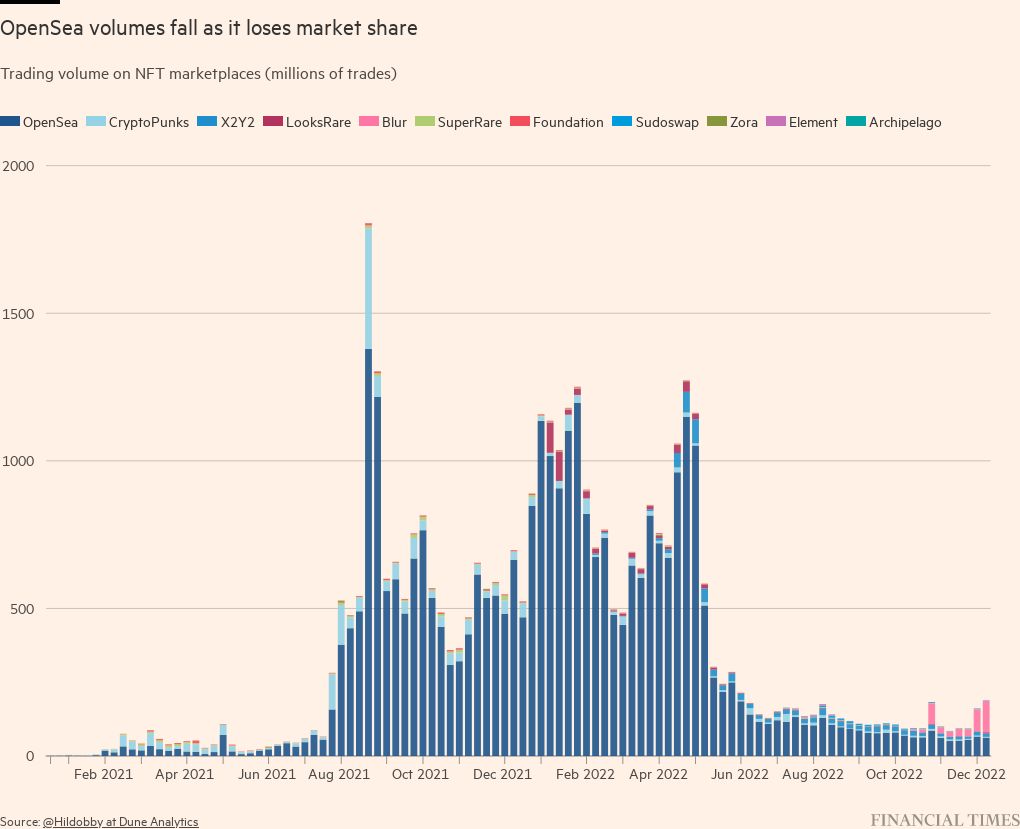OpenSea chief seeks to distance NFTs from crypto crisis

Roula Khalaf, Editor of the FT, selects her favourite stories in this weekly newsletter.
The chief executive of OpenSea, the world’s leading non-fungible token marketplace, has sought to distance NFTs from cryptocurrencies as the sector is hit by the knock-on impact of a series of scandals.
Devin Finzer, 32, told the Financial Times that the crypto industry had seen “some setbacks recently”, referencing the fall of FTX, the cryptocurrency exchange that collapsed into bankruptcy in November helping to trigger a fall in the value of digital assets.
OpenSea soared in value as NFTs, which can be online collectibles and digital art built upon the same blockchain technology as cryptocurrencies became a hype-fuelled market over the past two years.
But the head of New York-based company insisted that NFTs retain a bright future, believing that consumers will continue to spend real-world money to acquire digital images and display them in their homes and in online virtual spaces.
“It is not necessarily the case that NFTs will always be bought and sold denominated in cryptocurrency as they are today,” he said. “There are a variety of reasons why that makes sense in the current ecosystem, but as we get broader and more accessible, there is no reason that NFTs could not at least be denominated in US dollars.”
OpenSea has seen monthly trading volumes in cryptocurrency ether fall 95 per cent from a $4.9bn peak in January last year to $253mn in November, according to data from a user named “rchen” on Dune Analytics, information that OpenSea directed the FT towards as the private company does not disclose its own financial figures. The daily number of NFTs sold in ether on the platform has dropped 68 per cent from a peak of 2.3mn in January to 740,000 last month.
“NFTs do not exist in a vacuum, there is the overall macro climate which has changed dramatically, and that affects consumer spending and the broader crypto climate, which is experiencing a winter right now,” Finzer said.
The company cut 20 per cent of staff in July, with Finzer anticipating a “prolonged downturn” and leaving OpenSea with about 300 employees.
Finzer maintains that the company has a “healthy runway”, having raised $423mn over several funding rounds since 2021, which saw investments from venture capitalists Coatue and Andreessen Horowitz. Angels, including Reddit founder Alex Ohanian, actor Ashton Kutcher and singer Shawn Mendes, also participated in previous rounds.
OpenSea raised the majority of its capital, $300mn, during its most recent funding round announced in January this year, valuing the company at $13.3bn. It takes 2.5 per cent comission of the sale price on each transaction.
NFTs use blockchain technology to certify ownership of a digital asset, which is recorded on an immutable ledger of transactions. They use the same technology that underpins cryptocurrencies and are usually bought and sold in cryptocurrencies such as ether.
This year, the crypto market has suffered a series of scandals, including the collapse of stablecoin terraUSD and a marketwide crash that saw the price of popular tokens such as bitcoin plummet. A raft of legislation is being introduced to regulate the volatile industry, including the UK’s Financial Services and Markets bill and the EU’s Markets in Crypto-Assets Regulation.
Governments and law enforcement bodies worldwide are also deciding whether NFTs should be registered and disclosed as financial securities.
“It is really important that regulators and government officials understand that this is not the same as the broader crypto industry where there is a lot of focus around financial use cases,” Finzer said.
He said the value of NFTs should be decided by how people engage with it, whether through using tokens to attend exclusive events, play games, or display digital artwork in their homes.
“It is already the case that people are using Instagram [to share NFTs] with their friends,” Finzer said. “[In future] more and more of your property may be digital as opposed to physical art . . . right now, it is maybe early adopters that are displaying NFTs inside of their homes, but that could be something that continues to happen more and more.”

Comments